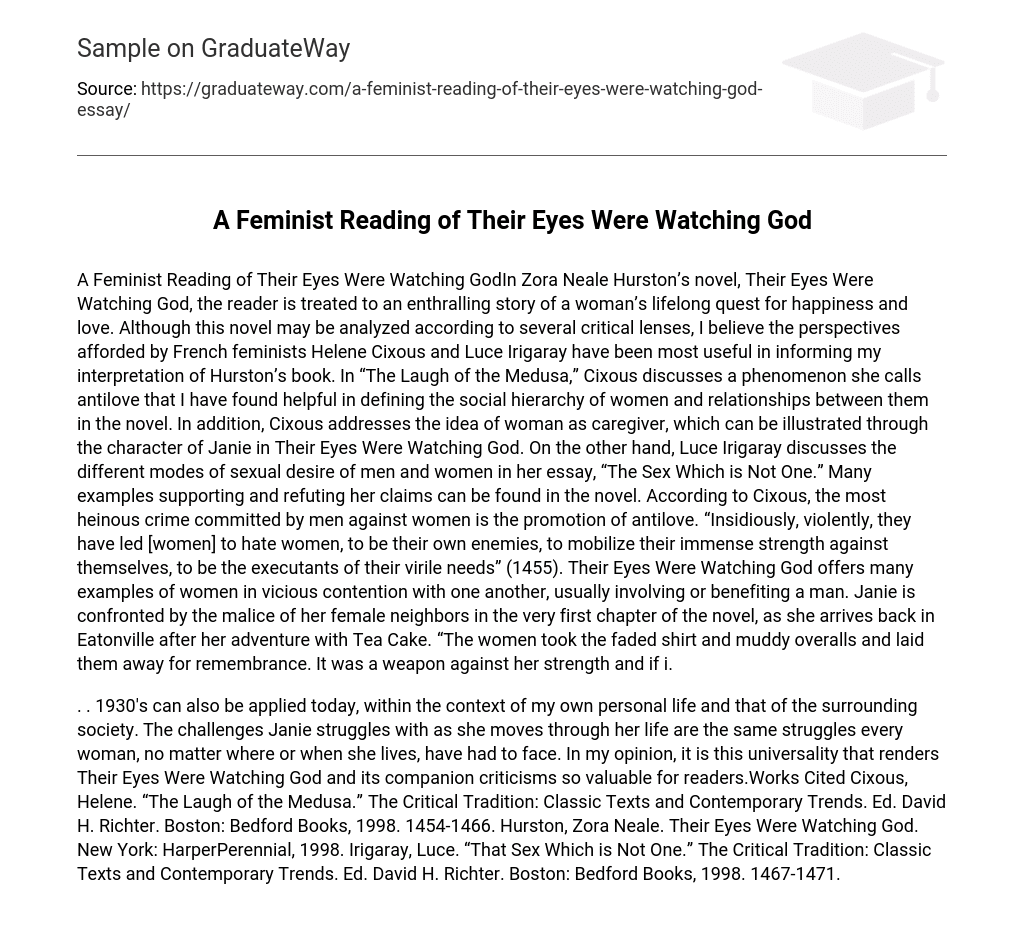A Feminist Reading of Their Eyes Were Watching GodIn Zora Neale Hurston’s novel, Their Eyes Were Watching God, the reader is treated to an enthralling story of a woman’s lifelong quest for happiness and love. Although this novel may be analyzed according to several critical lenses, I believe the perspectives afforded by French feminists Helene Cixous and Luce Irigaray have been most useful in informing my interpretation of Hurston’s book. In “The Laugh of the Medusa,” Cixous discusses a phenomenon she calls antilove that I have found helpful in defining the social hierarchy of women and relationships between them in the novel. In addition, Cixous addresses the idea of woman as caregiver, which can be illustrated through the character of Janie in Their Eyes Were Watching God. On the other hand, Luce Irigaray discusses the different modes of sexual desire of men and women in her essay, “The Sex Which is Not One.” Many examples supporting and refuting her claims can be found in the novel. According to Cixous, the most heinous crime committed by men against women is the promotion of antilove. “Insidiously, violently, they have led [women] to hate women, to be their own enemies, to mobilize their immense strength against themselves, to be the executants of their virile needs” (1455). Their Eyes Were Watching God offers many examples of women in vicious contention with one another, usually involving or benefiting a man. Janie is confronted by the malice of her female neighbors in the very first chapter of the novel, as she arrives back in Eatonville after her adventure with Tea Cake. “The women took the faded shirt and muddy overalls and laid them away for remembrance. It was a weapon against her strength and if i.
. . 1930’s can also be applied today, within the context of my own personal life and that of the surrounding society. The challenges Janie struggles with as she moves through her life are the same struggles every woman, no matter where or when she lives, have had to face. In my opinion, it is this universality that renders Their Eyes Were Watching God and its companion criticisms so valuable for readers.Works Cited Cixous, Helene. “The Laugh of the Medusa.” The Critical Tradition: Classic Texts and Contemporary Trends. Ed. David H. Richter. Boston: Bedford Books, 1998. 1454-1466. Hurston, Zora Neale. Their Eyes Were Watching God. New York: HarperPerennial, 1998. Irigaray, Luce. “That Sex Which is Not One.” The Critical Tradition: Classic Texts and Contemporary Trends. Ed. David H. Richter. Boston: Bedford Books, 1998. 1467-1471.





